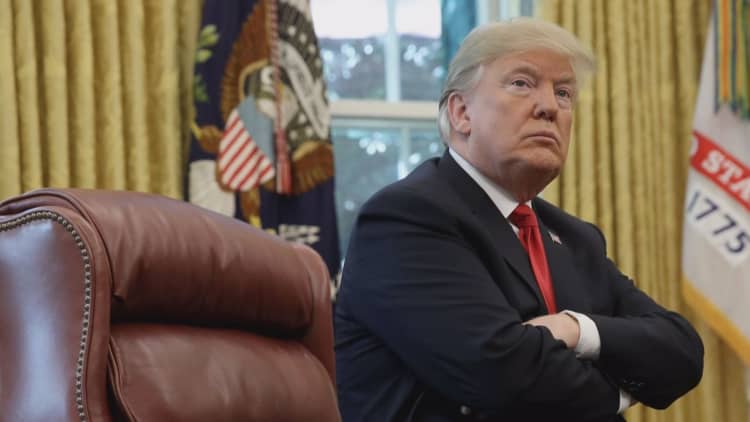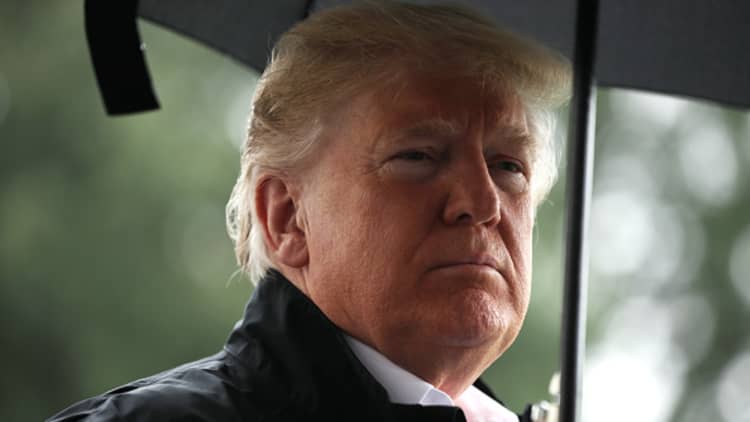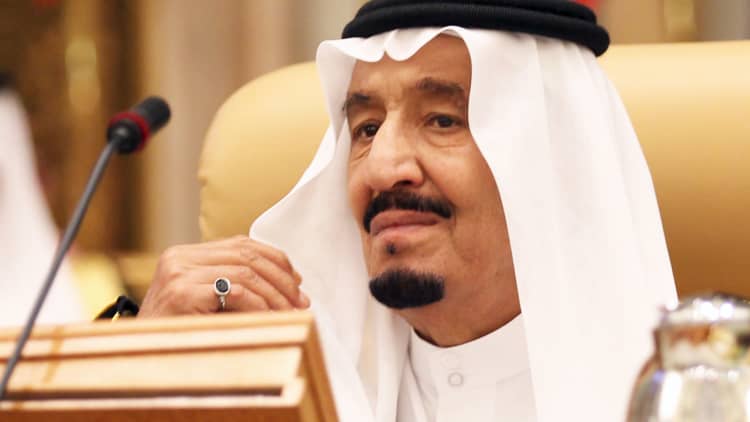The oil market is on edge after Saudi Arabia issued a combative statement that some are interpreting as a veiled threat to wield crude as a weapon in the ongoing scandal over missing dissident Jamal Khashoggi.
The question is whether Saudi Arabia — the world's largest oil exporter, a close ally of President Donald Trump and the de facto leader of OPEC — would take that extraordinary step, one it has not taken since the Arab oil embargo of 1973-1974.
To be sure, the current leadership in Riyadh is facing unprecedented scrutiny over allegations that the kingdom ordered the abduction of Khashoggi, a Saudi journalist and Washington Post columnist. Turkey says it believes that Saudi agents detained and killed Khashoggi at the kingdom's consulate in Istanbul. Saudi Arabia denies those claims.
The scandal has caused businesses, influential individuals and media companies to drop out of this month's Future Investment Initiative, a conference in Riyadh meant to attract investment in the kingdom. The United States and European nations have threatened punishment if Saudi Arabia is found to be behind Khashoggi's alleged murder.
That has caused Saudi Arabia to react forcefully. Here's why Riyadh's response is roiling the oil market.

What exactly did Saudi Arabia say to worry the market?
In interview excerpts released Saturday, Trump told the CBS program "60 Minutes" that the kingdom would face "severe punishment" if the allegations against it turn out to be true. This came after U.S. lawmakers raised the prospect of applying sanctions against Saudi individuals meant to punish human rights abuses.
The following morning, the Saudi Press Agency issued a statement saying Riyadh rejects all threats of economic sanctions, political pressure and false accusations, adding that it will respond to any action with "greater action."
What caught the eye of many oil market watchers was a reminder in the statement that "the Kingdom's economy has an influential and vital role in the global economy." Some took that as a veiled threat that Saudi Arabia could withhold supply and let oil prices rise.
A few hours later, the Saudi embassy in Washington, D.C., tweeted a clarification of the statement, saying it appreciated those who are not jumping to conclusions, including the United States.
Oil prices initially rose on Monday, but backed down after Trump said he spoke to Saudi Arabia's King Salman and was dispatching Secretary of State Mike Pompeo to Riyadh. Trump also suggested that "rogue killers" could have been responsible for Khashoggi's disappearance.
Why does this matter?
Saudi Arabia produces about 10.5 million barrels of oil per day, equal to more than 10 percent of global crude demand. It exports about 7 million barrels a day of oil, depending on the month.
Given those figures, the kingdom is a central pillar of the global oil market at any time. But its influence is especially pronounced right now.
That's because the Trump administration is aiming to wipe out oil exports from Iran, OPEC's third-biggest partner and a longtime enemy of both Saudi Arabia and the United States. Trump restored sanctions on Iran in May and gave oil buyers until Nov. 4 to stop importing Iranian crude.
Saudi Arabia is one of the few OPEC nations with enough spare capacity to offset the loss of Iranian barrels. The Trump administration is relying on the kingdom to increase output and blunt the upward pressure on oil prices caused by its Iran policy.
Brent crude recently hit a nearly four-year high above $86 a barrel, largely fueled by uncertainty over the impact of the Iran sanctions and concerns about Saudi Arabia's ability to fill the gap.

Why might Saudi Arabia pull the trigger?
Under the rule of King Salman and his son, the king-in-waiting Crown Prince Mohammed bin Salman, Saudi Arabia has taken the world by surprise several times with a bold and unapologetic approach to foreign policy.
In August, Canadian Foreign Minister Chrystia Freeland called on Saudi Arabia to release a women's rights activist. In response, the Saudis recalled their ambassador to Canada, expelled the nation's top diplomat to the kingdom, froze new business ties with Canada and forced Saudi students to return home from the North American country.
Saudi Arabia and the United Arab Emirates also orchestrated a swift, unexpected embargo against their neighbor, the tiny natural gas-rich country Qatar, in June 2017. Despite international pressure to lift diplomatic and economic barriers, the Saudis and Emiratis have kept the embargo in place.
At home, Crown Prince Mohammed oversaw the detainment of hundreds of influential Saudis last year, including members of the royal family. The kingdom portrayed the campaign as a crackdown on corruption, but many analysts believe it was also a move to consolidate power.
In short, it remains to be seen how far the current leadership of Saudi Arabia would go if faced with a severe punishment like economic sanctions or a refusal by the U.S. Congress to approve weapons sales to the kingdom.
"I think it's unlikely but I also think it's not outside of the realm of possibility," said John Kilduff, founding partner at energy hedge fund Again Capital.

What would stop Saudi Arabia?
First, using oil as a weapon could backfire. While higher oil prices would benefit producer nations like Saudi Arabia in the short term, rising crude costs also threaten to wipe out demand, particularly in emerging economies.
Oil ministers cited this concern in June, when a group of about two dozen nations agreed to put more oil on the market. Since then, prices have continued to rise, big oil consumers like India have complained anew about the cost of crude and prominent forecasters have knocked down their projections for oil demand.
The move would also threaten to erode Saudi Arabia's share of the global market, said Tamar Essner, director of energy and utilities at Nasdaq Corporate Solutions.
"As the largest oil exporter, Saudi certainly has the capacity to spark a price shock by dramatically cutting back on supplies," she said. "However, I don't think that they will ultimately go this route since doing so would also strengthen their regional and market share rivals — Iran, U.S. shale and renewable sources."
Second, allowing crude prices to percolate higher would likely worsen Saudi relations with the White House. Trump, wary of the price at the gas pump ahead of midterm elections, has repeatedly called on OPEC to tame oil prices, most recently at the United Nations General Assembly.
Higher gasoline prices threaten to eat into Americans' purchasing power and dampen their view of the economy.
Finally, Saudi Arabia has long been viewed as OPEC's de facto leader. Riyadh risks losing credibility if other members of the 15-nation cartel perceive the kingdom is using oil policy to settle political scores.
"The question is will Saudi really use this oil weapon?" Helima Croft, global head of commodity strategy at RBC Capital Markets told CNBC's "Closing Bell" on Monday. "That would endanger Saudi's reputation as a stable, reliable supplier to global markets."
WATCH: Saudi King orders internal investigation of Khashoggi case



